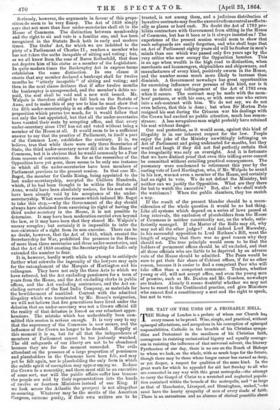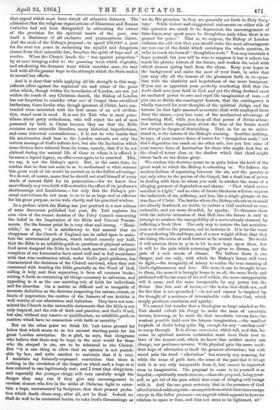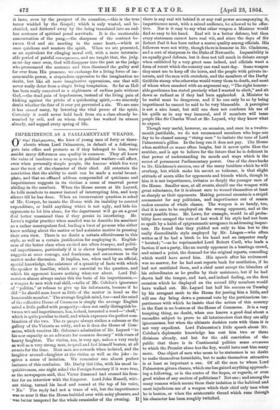that appeal which must have struck all attentive listeners. The
admission that the religious organizations of Dissenters and Roman Catholics had not been disregarded in estimating the extent of the provision for the spiritual wants of the poor, was itself a disclaimer of all exclusive and presumptuous claims. And the scale of the Bishop's proposal—to spend 100,000/ a year for the next ten years in reclaiming the squalid and dangerous classes from their miserable fate, breathes the spirit of hope and of resolve. When the Church heads the " war against pauperism" by at once bringing relief to the gnawing want which degrades, and awakening the dormant want which ennobles man, we may look with all the greater hope to the attempts which the State makes to second her efforts.
And it is clear-that while applying all his strength to this mag- nificent effort against the organized sin and crime of the great cities which, though within the boundaries of London, are not yet within the reach of any Christian church, the Bishop of London has not forgotten to consider what sort of Gospel these subtilized barbarians, these hordes who, though ignorant of Christ, have con- tracted vices saturated with the foul steam of an evil civiliza- tion, stand most in need. It is not Dr. Tait who is most punc- tilious about petty orthodoxies, who will reject the aid of men possessed by faith in Christ because they see that the Bible contains some scientific blunders, many historical imperfections, and some historical contradictions ; it is not he who insists that his missionaries shall bear to the London outcasts not only the certain message of God's infinite love, but also the limitation which some divines have inferred from its terms, namely, that if it be not claimed during the natural life of those to whom it is offered it becomes a lapsed legacy, an offer never again to be renewed. This, we say, is not the Bishop's spirit. But, at the same time, we confess that he does not seem to us to understand in what manner this great work of his would be carried on to the fullest advantage. We do not, of course, mean that he should not avail himself of every shade of earnest faith for its prosecution,—for we know how marvellously any true faith will neutralize the effect of its professor's shortcomings and fanaticisms,— but only that the Bishop's per- sonal convictions do not seem to us to be as large and as efficient for his great purpose, as his wide charity and his practical wisdom.
In a preface which the Bishop has just prefixed to a new edition of some discourses published last year, Dr. Tait explains his own view of the recent decision of the Privy Council concerning the belief in the Inspiration of the Bible and Eternal Punish- ments. On the former point he is very clear and strong. " Mean- while," he says, " it is satisfactory to feel assured that no clergyman of the Church of England can be called upon to main- tain the unwarranted position, which indeed scarcely any hold, that the Bible is an infallible guide in questions of physical science. God never designed the Bible to teach such matters ; and the great compilers of our formularies have acted well and in full accordance with that wise moderation which, under God's good guidance, has characterized the decisions of the Church universal, when they rest contented with treating the Bible generally as the Word of God, calling it holy, and thus separating it from all common books; setting it forth as containing all things necessary to salvation, and appealing to it as the one unerring rule of faith for individuals and for churches. On a matter so difficult and so incapable of accurate definition as the doctrine respecting the nature, extent, or limits of inspiration, the caution of the framers of our Articles is well worthy of our admiration and imitation. They have not com- mitted the Church to the untenable statements that the Bible is not only inspired, and the rule of faith and practice, and God's Word, but also, without any reserve or qualification, an infallible guide in matters which have no connection with faith or morality."
But on the other point we think Dr. Tait takes ground far below that which seems to us the natural starting-point for his great London enterprise. Ile is glad, he says, that clergymen who believe that there may be hope in the next world for those who die steeped in sin, are to be tolerated in the Church. But "it is one thing to allow that an opinion is not punish- able by law, and quite another to maintain that it is true.
I maintain my formerly-expressed conviction that there is nothing in the revelation of the Gospel on which such a hope as is here referred to can legitimately rest; and I trust that clergymen, and especially the younger clergy, will very carefully weigh the danger they may run if they give any encouragement to careless sinners who live in the midst of Christian light to enter- tain a hope, unwarranted by Scripture, that their present proba- tion which death closes may, after all, not be final. Indeed, we shall do well to be contented herein, to take God's threatenings as
we do His promises, 'as they are generally set forth in Holy Scrip- ture.' While violent and exaggerated statements on either side of this question are much to be deprecated, the encouragement of false hopes may speak peace to thoughtless souls when there is no ground for peace." That is, we suppose, the Bishop of London endorses the old view that you should make the most advantageous use you can of the doubt which envelopes the whole question, in order to reach the fears of " thoughtless souls." You may entertain a hope yourself, but you will be wise to suppress it lest it relieve too much the gloomy terrors of the future, and weaken the recoil with which sinners spring back from the abyss. Keep your hopes in the background and make the most of your fears, in order that you may ally all the terrors of the gloomiest faith in co-opera- tion with the elasticity and hopefulness of one more benignant. If you can so apportion your probably everlasting Hell that the doubt shall save your faith in God, and yet the thing doubted exert an unabated power to awe and repel the imagination of man, —if you can so divide the contingent horrors, that the contingency is wholly reserved for your thoughts of the spiritual Judge, and the horrors (in that light assumed as certain) shall with unalloyed force deter the sinner,—you lose none of the mechanical advantage of everlasting Hell, while you keep all that power of divine attrac- tion which stern dogmatists about the fires of the future world are always in danger of diminishing. That, as far as we under- stand it, is the nature of the Bishop's warning. Sacrifice nothing, he says, of your reserve force of terror for " thoughtless souls," but don't dogmatize too much on the other side, lest you lose some of your reserve force of fascination for those who might look less at the cloud of terror than at the shadow which that cloud might throw back on the divine glory.
We confess this doctrine seems to us quite below the level of the great work to which the Bishop is exhorting us. We believe the modern fashion of separating between the sin and the penalty is not only alien to the genius of the Gospel, but a dead loss of power in dealing with those in whom you wish to awaken the sense of a clinging garment of degradation and shame. " That which makes manifest is Light," and no vista of future blackness will ever express the infinitude of sin, suffering, and loss, like a single glimpse of the true face of Christ. The hordes whom the Bishop exhorts us to assail are already hardened, no doubt, to endure a Hell rendered at once endurable, and yet more dreadful, by apathy. To threaten them with the infinite extension of that Hell into the future is only to attempt to awaken the susceptibility of a nerve already stunned, by inflicting a fresh blow. The only way to restore the lost sensitive- ness is to relieve the pressure, not to increase it. It is for the want of a quickening life and hope, not of a new weight of fear, that they are losing the sense of such horrors as lie around them. No doubt it will awaken them to p tin to let in new hope upon them, but it will be the pain which returning life gives to disease, not the pain of a new access of disease. We believe there is one danger, and one only, with which the Bishop's forces will have to fight,—the incapacity of misery to realize the true meaning of God's righteousness and love. The more it can be brought home to them, the more it is brought home to us all, the more lively and profound will be our sense of the evil within, the more insupportable will it seem, and the more insuperable by any power but the divine. But this sort of terror,—" the worm that dieth not, and the fire that is not quenched,"—is not and cannot be inspired by the thought of a sentence of interminable exile from God, which simply produces numbness and apathy.
We cannot but wonder that a theologian so large-minded as Dr. Tait should exhort his clergy to make the most of uncertain terrors, knowing, as he must do, that uncertain terrors have the weakest possible hold over the human imagination, —the smallest loophole of doubt being quite big enough for any "careless soul"
to creep through. It is divine certainties which tell, and this, be-
cause in spiritual matters certainties must have their root in laws of the inmost soul, which we know that neither mercy can change, nor penitence reverse. With physical pain the mere confi- dent hope of alleviation is itself the greatest alleviation ; but with moral pain the word "alleviation" has scarcely any meaning, for while the sense of guilt lasts, the sense of the pain that it brings with it is not only inseparable from it, but cannot be separated even in imagination. The proposal to cease to be yourself is as
hopeful,—spiritually much more so,—than the proposal, being your-
self, to get rid of the pain which that sense of clinging evil brings with it. And the one great certainty that in the presence of God
all evil is intolerable anguish—an anguish from which there is no escape except in His fuller presence—an anguish which appears to have no relation to space or time, and does not seem to be lightened, wh-
it lasts, even by the prospect of its cessation,—this is the true terror wielded by the Gospel ; which is only wasted, and be- clouded, and frittered away by the being translated into an end- less sentence of spiritual penal servitude. It is the unutterable concentration of the pang,—the sharpness of the contrast be- tween God and sin meeting in the same heart,—which at once quickens and masters the spirit. When we are presented, as an equivalent for clinging moral evil, with a mere intermin- able period of painful consequences, and are taught that, the judg- ment-day once over, God will disappear into the past as the judge who pronounced the sentence and then dismissed the guilty soul for ever from His presence, we exchange for a living force of im- measurable power, a stupendous oppression to the imagination no doubt, but like all mere imaginative oppressions, one that will never really deter from a single living temptation. So far as Hell has been really conceived as a nightmare of endless pain without God,—the dead pain of hopelessness, instead of the living pain of kicking against the pricks of a quickening spirit,—we sincerely doubt whether the fear of it ever yet prevented a sin. We are sure it has caused many, by lowering the vital power of the spirit. Certainly it could never hold back from sin a class already be- numbed by evil, and on whom despair has worked its utmost already, and sapped every spring of life.
































 Previous page
Previous page